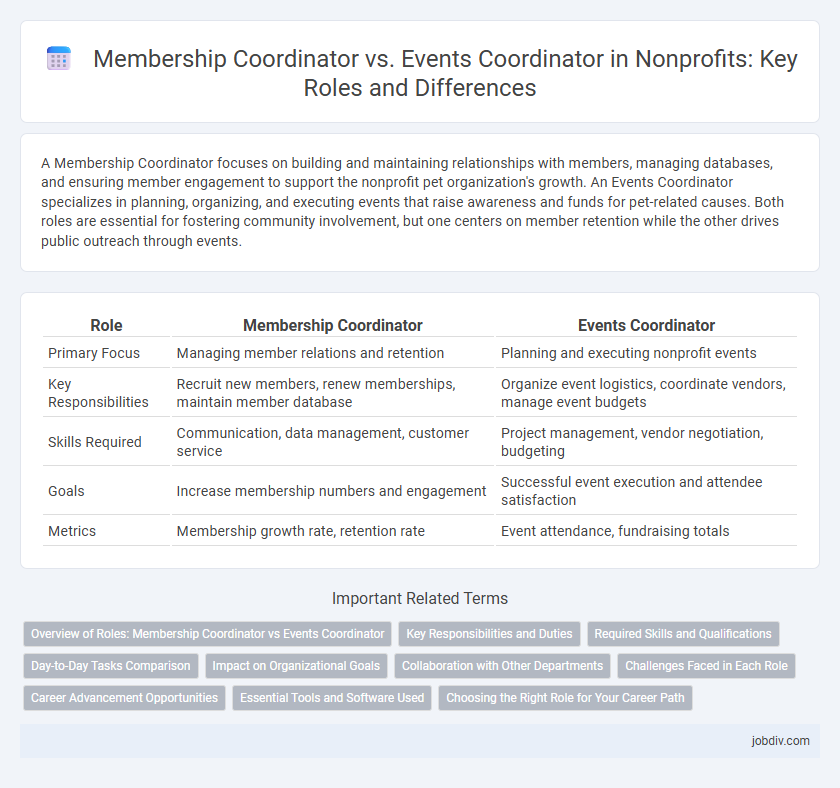A Membership Coordinator focuses on building and maintaining relationships with members, managing databases, and ensuring member engagement to support the nonprofit pet organization's growth. An Events Coordinator specializes in planning, organizing, and executing events that raise awareness and funds for pet-related causes. Both roles are essential for fostering community involvement, but one centers on member retention while the other drives public outreach through events.
Table of Comparison
| Role | Membership Coordinator | Events Coordinator |
|---|---|---|
| Primary Focus | Managing member relations and retention | Planning and executing nonprofit events |
| Key Responsibilities | Recruit new members, renew memberships, maintain member database | Organize event logistics, coordinate vendors, manage event budgets |
| Skills Required | Communication, data management, customer service | Project management, vendor negotiation, budgeting |
| Goals | Increase membership numbers and engagement | Successful event execution and attendee satisfaction |
| Metrics | Membership growth rate, retention rate | Event attendance, fundraising totals |
Overview of Roles: Membership Coordinator vs Events Coordinator
A Membership Coordinator manages recruitment, engagement, and retention of members, ensuring consistent communication and support to foster a loyal community. An Events Coordinator plans, organizes, and executes events, handling logistics, vendor coordination, and attendee experience to promote the nonprofit's mission. Both roles are essential for member involvement and organizational visibility but focus on distinct aspects of outreach and support.
Key Responsibilities and Duties
A Membership Coordinator manages member recruitment, retention, and database accuracy, ensuring engagement through communication and benefits administration. An Events Coordinator plans, organizes, and executes nonprofit events, handling logistics, vendor coordination, and volunteer management to maximize participation and fundraising. Both roles require strong interpersonal skills, but the Membership Coordinator centers on fostering member relationships, while the Events Coordinator focuses on event implementation and operational success.
Required Skills and Qualifications
A Membership Coordinator excels in relationship management, database proficiency, and communication skills to effectively engage and retain members within a nonprofit organization. Essential qualifications include experience with CRM software, data analysis, and the ability to craft targeted outreach strategies. An Events Coordinator requires strong organizational abilities, budgeting expertise, and vendor negotiation skills to plan and execute successful nonprofit events, with a background in event management and proficiency in project management tools being crucial.
Day-to-Day Tasks Comparison
A Membership Coordinator manages member databases, processes applications, and handles communication to maintain and grow the nonprofit's membership base. An Events Coordinator plans, organizes, and executes fundraising events, coordinating logistics, vendors, and volunteer staff to ensure successful event outcomes. While the Membership Coordinator focuses on member engagement and retention through regular outreach, the Events Coordinator concentrates on event management and stakeholder collaboration for special programming.
Impact on Organizational Goals
A Membership Coordinator directly influences organizational growth by increasing member retention and engagement, driving steady revenue streams critical for nonprofit sustainability. An Events Coordinator amplifies visibility and fundraising success through strategic event planning that fosters community involvement and donor relationships. Both roles are essential but differ in focus: membership cultivates a loyal support base, while events generate immediate impact and broaden outreach.
Collaboration with Other Departments
A Membership Coordinator collaborates closely with fundraising and outreach teams to enhance member engagement and retention through targeted communication strategies. An Events Coordinator works with marketing and program departments to plan and execute events that align with organizational goals and maximize community participation. Both roles require strong interdepartmental collaboration to ensure cohesive messaging and the successful delivery of programs.
Challenges Faced in Each Role
Membership Coordinators face challenges such as maintaining member engagement, managing renewals, and personalizing communication to sustain long-term relationships. Events Coordinators encounter difficulties in logistics planning, vendor coordination, and ensuring event attendance aligns with organizational goals. Both roles require strong organizational skills but differ in focus--membership growth versus event execution--to support nonprofit success.
Career Advancement Opportunities
Membership Coordinators play a critical role in managing member relations, fostering community engagement, and driving membership growth, which cultivates skills in communication and strategic planning essential for leadership positions within nonprofits. Events Coordinators develop expertise in organizing large-scale fundraising and awareness events, enhancing project management, budget oversight, and vendor negotiation capabilities valuable for senior operations roles. Both career paths offer advancement opportunities, with Membership Coordinators often progressing toward membership director or community outreach manager roles, and Events Coordinators moving into senior event management or director of special events positions.
Essential Tools and Software Used
Membership Coordinators rely heavily on CRM platforms like Salesforce Nonprofit Cloud and Wild Apricot to manage member databases, track engagement, and automate renewals, ensuring seamless communication and retention. Events Coordinators utilize event management software such as Eventbrite, Cvent, and Splash to handle registrations, ticketing, and logistics for nonprofit fundraising and awareness events. Both roles benefit from collaboration tools like Slack and Trello, but their core software ecosystems prioritize membership lifecycle management versus event execution and attendee experience.
Choosing the Right Role for Your Career Path
A Membership Coordinator focuses on growing and engaging a nonprofit's member base by managing communication, retention strategies, and membership benefits, which is ideal for those passionate about community building and relationship management. In contrast, an Events Coordinator plans and executes fundraising, awareness, and volunteer events, requiring strong organizational and project management skills suited for individuals who thrive in fast-paced environments and enjoy logistical challenges. Choosing the right role depends on whether you want to specialize in member engagement and long-term community connection or dynamic event planning and execution within the nonprofit sector.
Membership Coordinator vs Events Coordinator Infographic

 jobdiv.com
jobdiv.com